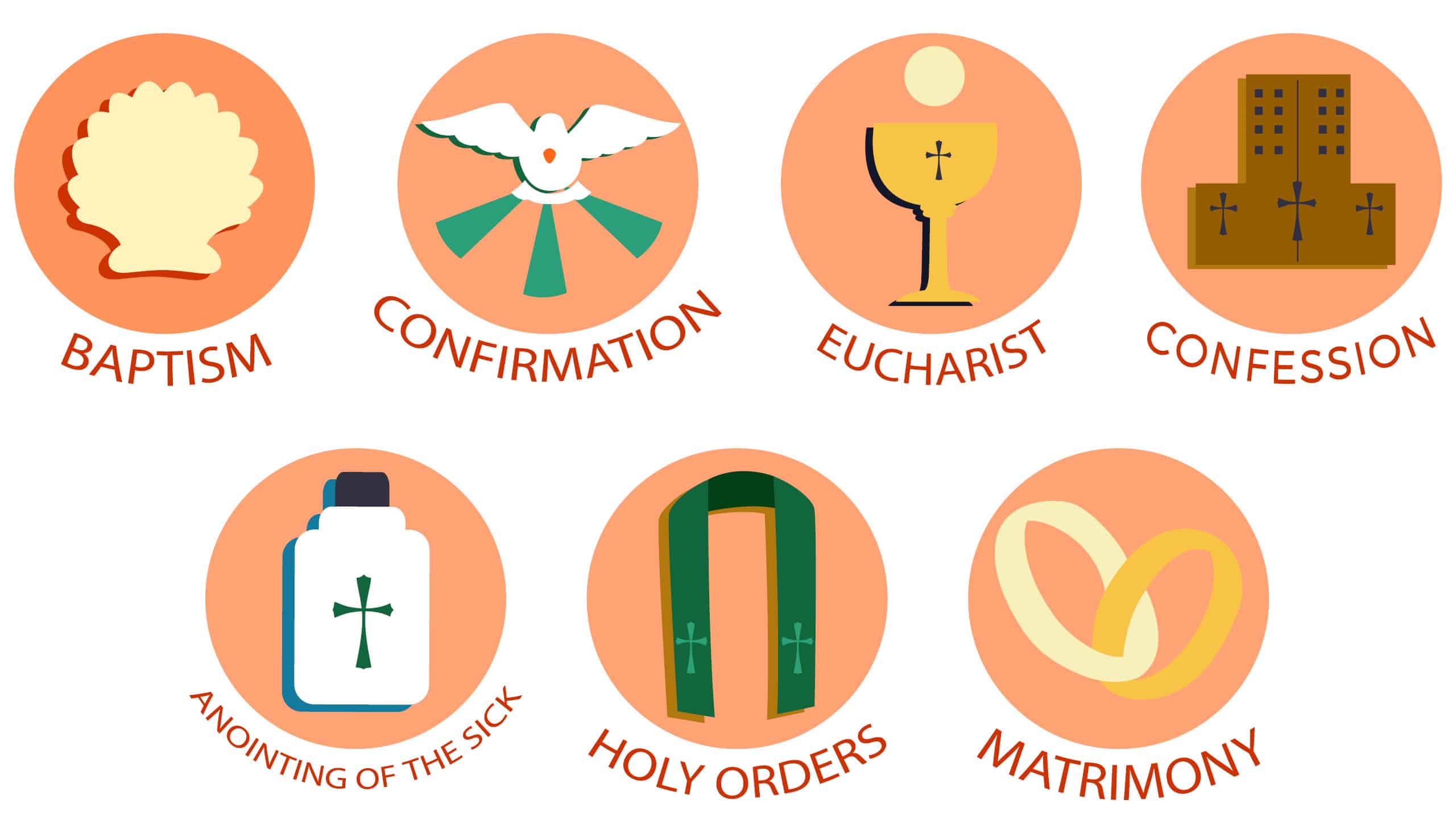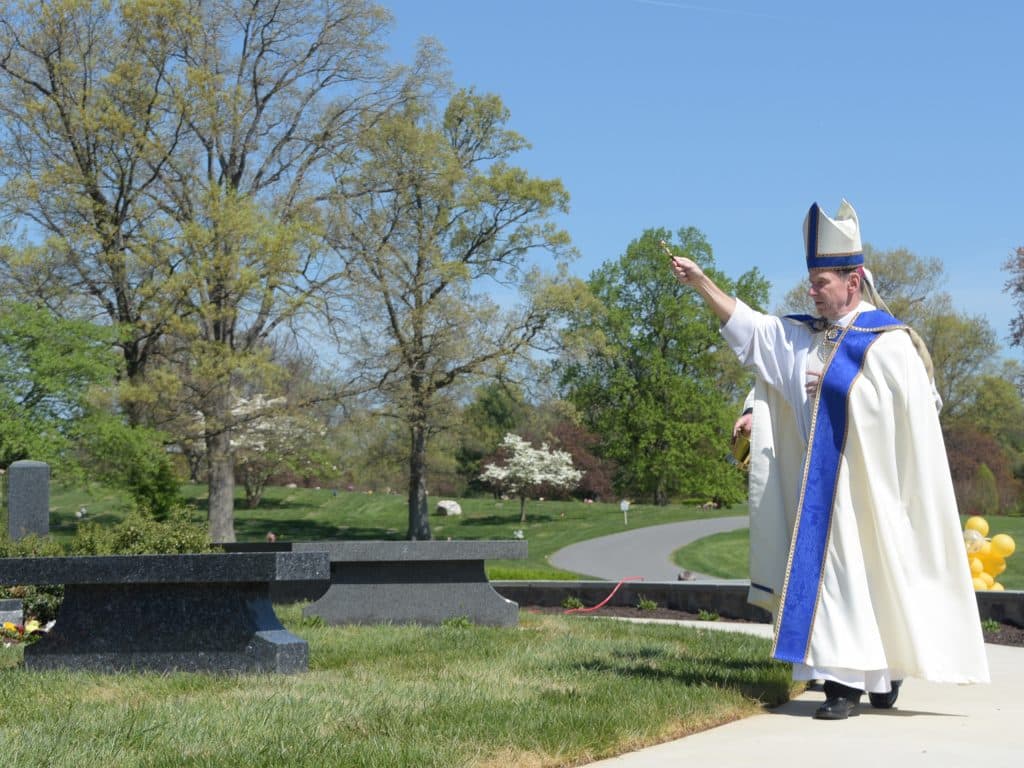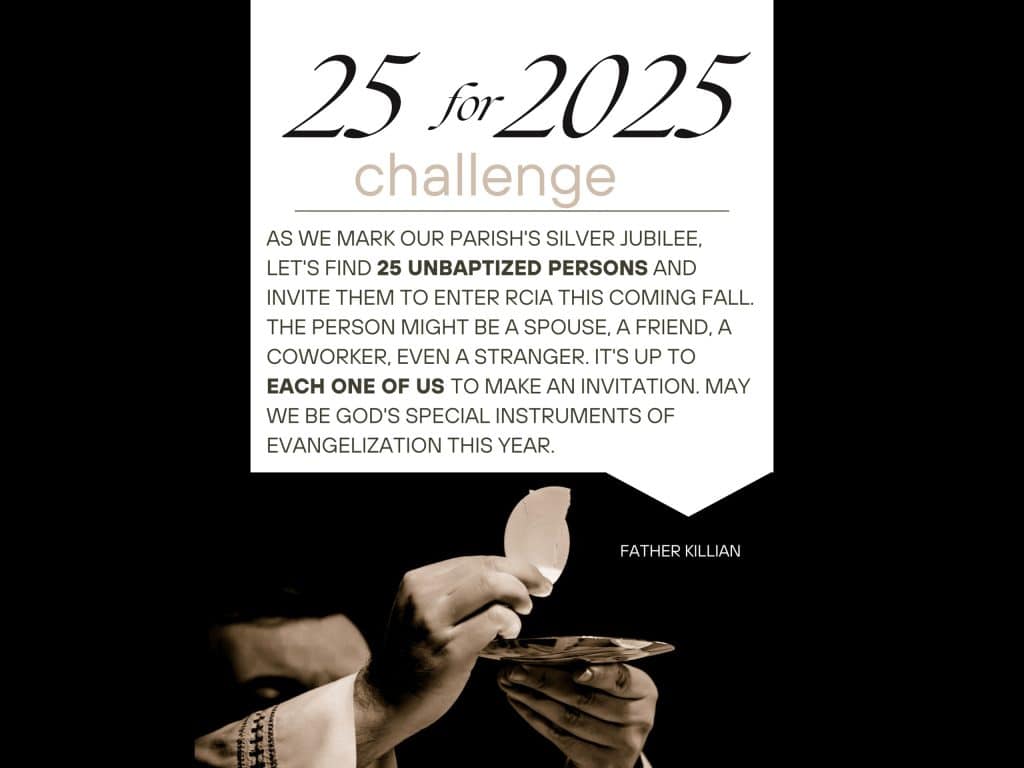There’s no verse of the Bible that lists the seven sacraments. Yet, references to the sacraments are found all throughout sacred Scripture, says Owen Vyner, chair of the theology department at Christendom College in Front Royal.
“The fact that we can trace every sacrament either explicitly to Christ or to the practice of the church (within) the first two decades after the resurrection tells us that the seven sacraments were in the life of the church from the beginning,” said Vyner. “Already in the Acts of the Apostles we read about the ‘breaking of bread,’ Sunday gatherings of the church, baptism and the outpouring of the Holy Spirit through the laying (on) of hands.
“As the church moved from Jerusalem into Rome, Greece, Palestine, etc., she took these basic elements as given to her by Christ and developed them,” he said. “In writings that we have from the first two centuries of Christianity we see how, while the essential element of each sacrament never changes, rites began to emerge for each sacrament.”
Not only Christ’s words but also his actions shed light on the sacraments. Vyner noted that Christ’s promise of the gift of the Holy Spirit prefigures confirmation, his washing of the apostles’ feet is a gesture that heralds back to the Jewish priesthood and his presence at the wedding feast at Cana in which he links spousal love to his ‘hour’ — his passion — prefigures the sacramentality of marriage.
The seven sacraments — baptism, confirmation, the Eucharist, confession, anointing of the sick, holy orders and marriage — are “material signs that bring about a divine reality, namely, sanctification and healing,” said Vyner.
In anticipation of the Diocesan Golden Jubilee, the diocese has emphasized remembering “the foundational truths of the Catholic faith,” and themed the current preparatory year on the Eucharist, “Do this in remembrance of me.” Read more about the biblical origins of the seven sacraments:
Baptism
In baptism, an infant or unbaptized person has water poured over his or her head while the baptizer invokes the Holy Trinity. The newly baptized Christian is forgiven of all original and personal sin and becomes an adopted child of Christ and member of the church.
Jesus led by example when he was baptized in the Jordan River by his cousin John the Baptist. “Then Jesus came from Galilee to John at the Jordan to be baptized by him.” Matthew 3:13
As he ascended into heaven, Jesus instructed the apostles to baptize others. “Go, therefore, and make disciples of all nations, baptizing them in the name of the Father, and of the Son, and of the Holy Spirit.” Matthew 28:19
He confirmed the importance of baptism when he said, “Amen, amen, I say to you, no one can enter the kingdom of God without being born of water and Spirit. ” John 3:5
The practice of baptizing infants began early in the church’s history, possibly during the time of the apostles, as the New Testament includes stories of whole households being baptized.
“One of them, a woman named Lydia, a dealer in purple cloth, from the city of Thyatira, a worshipper of God, listened, and the Lord opened her heart to pay attention to what Paul was saying. After she and her household had been baptized … ” Act 16:14-15
“I baptized the household of Stephanas also.” 1 Corinthians 1:16
Confirmation
In confirmation, a baptized Christian is anointed with sacred chrism on the forehead. After the laying on of hands, the minister says, “be sealed with the gift of the Holy Spirit.” In the Scriptures, baptism and the outpouring of the Holy Spirit often are linked, and the church teaches that confirmation completes the grace of baptism. “Not because of any righteous deeds we had done but because of his mercy he saved us through the bath of rebirth and renewal by the Holy Spirit.” Titus 3:5
After Pentecost, the apostles would lay their hands on newly baptized Christians, which bestowed upon them the gift of the Holy Spirit. “Now when the apostles in Jerusalem heard that Samaria had accepted the word of God, they sent them Peter and John, who went down and prayed for them, that they might receive the Holy Spirit, for it had not yet fallen upon any of them; they had only been baptized in the name of the Lord Jesus. Then they laid hands on them and they received the Holy Spirit.” Acts 8:14-17
Eucharist
When the priest speaks the words of consecration — words Christ spoke at the Last Supper — Catholics believe that the bread and wine on the altar become Christ’s body and blood. “Then he took the bread, said the blessing, broke it, and gave it to them, saying, ‘This is my body, which will be given for you; do this in memory of me.’ And likewise the cup after they had eaten, saying, ‘This cup is the new covenant in my blood, which will be shed for you.’ ” Luke 22:19-20
When Jesus spoke to the crowds about the Eucharist, many were confused and disgusted. But Christ reaffirmed that the Eucharist — his own body and blood — is the path to heaven. “ ‘I am the living bread that came down from heaven; whoever eats this bread will live forever; and the bread that I will give is my flesh for the life of the world.’ The Jews quarreled among themselves, saying, ‘How can this man give us his flesh to eat?’ Jesus said to them, ‘Amen, amen, I say to you, unless you eat the flesh of the Son of Man and drink his blood, you do not have life within you. Whoever eats my flesh and drinks my blood has eternal life, and I will raise him on the last day. For my flesh is true food, and my blood is true drink. Whoever eats my flesh and drinks my blood remains in me and I in him.’ ” John 6:51-56
Confession
During confession, penitents repent of their sins, tell their sins to the priest and then make reparation for their sins by performing a penance. With the authority of the church, the priest forgives sins in the name of Christ. When Jesus taught his disciples how to pray, he instructed them to ask for forgiveness from God. “And forgive us our sins, for we ourselves also forgive everyone who is indebted to us.” Luke 11:4
As he called his disciples, Jesus told them to repent. “The time is fulfilled, and the kingdom of God is at hand; repent and believe in the Gospel.” Mark 1:15
Only God can forgive sins, but Jesus entrusted the power to absolve sins to his apostles. “Jesus said to them again, ‘Peace be with you. As the Father has sent me, so I send you.’ And when he had said this, he breathed on them and said to them, ‘Receive the holy Spirit. Whose sins you forgive are forgiven them, and whose sins you retain are retained.’ ” John 20:21-23
After Christ’s ascension, the disciples go out to the world and carry on his ministry of reconciliation. “And all this is from God, who has reconciled us to himself through Christ and given us the ministry of reconciliation, namely, God was reconciling the world to himself in Christ, not counting their trespasses against them and entrusting to us the message of reconciliation. So we are ambassadors for Christ, as if God were appealing through us. We implore you on behalf of Christ, be reconciled to God.” 2 Corinthians 5:18-20
Anointing of the Sick
In anointing of the sick, a priest anoints someone facing difficulties due to grave illness or old age and prayerfully asks for the grace of the sacrament to come over them. Throughout the Gospels, Christ demonstrates that he is capable of healing people, both spiritually and physically, for the benefit of the afflicted and those around them.
“ ‘Which is easier, to say to the paralytic, “Your sins are forgiven,” or to say, “Rise, pick up your mat and walk?” But that you may know that the Son of Man has authority to forgive sins on earth’ — he said to the paralytic, ‘I say to you, rise, pick up your mat, and go home.’ He rose, picked up his mat at once, and went away in the sight of everyone. They were all astounded and glorified God, saying, ‘We have never seen anything like this.’ ” Mark 2:9-12
Jesus also said that his disciples would have the power to heal people. “These signs will accompany those who believe: in my name they will drive out demons, they will speak new languages. They will lay hands on the sick, and they will recover.” Mark 16:17-18
St. Paul wrote about the gift of healing. “To each individual the manifestation of the spirit is given for some benefit. To one is given through the spirit the expression of wisdom; to another the expression of knowledge according to the same spirit; to another faith by the same spirit; to another gifts of healing by the one spirit.” 1 Corinthians 12:7-9
The church believes in healing the sick though physically caring for those who are ill, through intercessory prayer and through the anointing of the sick, a rite described by St. James. “Is anyone among you sick? He should summon the presbyters of the church, and they should pray over him and anoint him with oil in the name of the Lord, and the prayer of faith will save the sick person, and the Lord will raise him up. If he has committed any sins, he will be forgiven.” James 5:14-15
Holy Orders
In the Old Testament, God set aside the tribe of Levi for liturgical service. The New Testament links the priestly ministry of the new covenant with the old. “Every high priest is taken from among men and made their representative before God, to offer gifts and sacrifices for sins. No one takes this honor upon himself but only when called by God, just as Aaron was. In the same way, it was not Christ who glorified himself in becoming high priest, but rather the one who said to him: ‘You are my son; this day I have begotten you;’ just as he says in another place: ‘You are a priest forever according to the order of Melchizedek.’ ” Hebrews 5:1, 4-6
Through holy orders, the mission Christ entrusted to his apostles continues and this started in the earliest days of the church. “For this reason I left you in Crete so that you might set right what remains to be done and appoint presbyters in every town, as I directed you.” Titus 1:5
Holy Orders includes three degrees: episcopacy, presbyterate and diaconate, or bishops, priests and deacons. The sacrament is conferred by the laying on of hands followed by a solemn prayer of ordination. “Do not neglect the gift you have, which was conferred on you through the prophetic word with the imposition of hands of the presbyterate.” 1 Timothy 4:14
“For this reason, I remind you to stir into flame the gift of God that you have through the imposition of my hands.” 2 Timothy 1:6
According to the Catechism of the Catholic Church, in the Latin Church, priests remain celibate in order to consecrate themselves with an undivided heart to the Lord. “Some are incapable of marriage because they were born so; some, because they were made so by others; some, because they have renounced marriage for the sake of the kingdom of heaven. Whoever can accept this ought to accept it.” Matthew 19:12
“I should like you to be free of anxieties. An unmarried man is anxious about the things of the Lord, how he may please the Lord.” 1 Corinthians 7:32
Marriage
In marriage, a man and a woman freely give themselves to one another in a binding, lifelong partnership. Sacred Scripture begins with the creation of man and woman and concludes with a wedding.
“God created mankind in his image; in the image of God he created them; male and female he created them.” Genesis 1:27
“Let us rejoice and be glad and give him glory. For the wedding day of the Lamb has come, his bride has made herself ready.” Revelation 19:7
God’s fidelity to Israel in the Old Testament mirrors a faithful marriage, though the Israelites’ treatment of God better reflects a faithless marriage. “Again the Lord said to me: Go, love a woman who is loved by her spouse but commits adultery; just as the Lord loves the Israelites, though they turn to other gods.” Hosea 3:1
According to the catechism, “Seeing God’s covenant with Israel in the image of exclusive and faithful married love, the prophets prepared the Chosen People’s conscience for a deepened understanding of the unity and indissolubility of marriage.”
Christ explicitly spoke about marriage as a lifelong union to his followers. “They replied, ‘Moses permitted him to write a bill of divorce and dismiss her.’ But Jesus told them, ‘Because of the hardness of your hearts he wrote you this commandment. But from the beginning of creation, “God made them male and female. For this reason a man shall leave his father and mother and be joined to his wife, and the two shall become one flesh.” So they are no longer two but one flesh. Therefore what God has joined together, no human being must separate.’ In the house the disciples again questioned him about this. He said to them, ‘Whoever divorces his wife and marries another commits adultery against her; and if she divorces her husband and marries another, she commits adultery.’ ” Mark 10:4-12
Jesus performed his first miracle at the wedding feast at Cana, where he turned water into wine. “The Church attaches great importance to Jesus’ presence at the wedding at Cana,” said the catechism. “She sees in it the confirmation of the goodness of marriage and the proclamation that thenceforth marriage will be an efficacious sign of Christ’s presence.”
St. Paul told the Ephesians to love their spouses with sacrificial love. “Husbands, love your wives, even as Christ loved the Church.” Ephesians 5:25
~
Verses from throughout the Bible coalesce and form the basis of Catholic Herald sacraments flyer what the Catholic Church calls the seven sacraments.
Download “Sacraments in the Scriptures” HERE.



